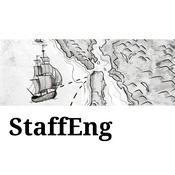After 3 years, we’re coming out of retirement, because something fundamental broke open in the last few months—something that changes everything about how we work.
We Don’t Know How to Learn This Yet
AI coding tools promise a 10X—maybe 100X—productivity boost. But here’s what we’re seeing: most engineers don’t know how to learn these tools. The old playbook—read the docs, practice, master—doesn’t work when the tools are fundamentally stochastic and changing weekly. Even worse, there’s nowhere to go for real instruction. Documentation tells you what features exist, not how to think differently about your work.
I’ve never felt this much behind as a programmer. The profession is being dramatically refactored as the bits contributed by the programmer are increasingly sparse and between. I have a sense that I could be 10X more powerful if I just properly string together what has become available over the last ~year… - @karpathy
Deep Conversations with Practitioners
We’re rebooting the Staff Engineer podcast with a specific focus: practitioners using AI to deliver valuable outcomes with specific examples.
The Future Isn’t Evenly Distributed
Right now, there are deep pockets of breakthrough AI usage everywhere. From engineers, to philosophers. Small teams moving at speeds large organizations can’t match..
These practices exist, but they’re isolated.
What We’re Looking For
Practitioners over theorists. We’re not interested in abstract conversations about what AI might do. If you’re using AI to deliver outcomes and have specific examples of what worked and what didn’t, we want to talk.
Details over declarations. “AI made me 10X more productive” is a headline. “I rewrote my entire workflow around X pattern, which failed until I realized Y, and now I’m shipping features in days that used to take weeks” is the conversation we want.
Diverse domains, unified question. We’re starting with staff engineers because that’s our foundation—engineers expected to show great judgment at scale. But we’ll talk to anyone whose work sheds light on our core question: What does good engineering judgment look like when the tools are stochastic, the landscape changes monthly, and the bottleneck shifts from implementation to direction?
Our Thesis
A fundamental shift is happening in how we work. The engineers authoring this future—not just experiencing it—will have massive advantages. We choose authorship.
But we don’t know what that looks like yet. We don’t have the playbook. That’s what we’re building.
How to Participate
We’re setting this up in two ways:
1. Join Our Listening Sessions
Before we start recording episodes, we want to hear from you. We’re organizing Zoom sessions to discuss:
What you’re running into with AI in your work
The problems you’re facing
The surprising wins
The bureaucratic barriers
The things you wish someone would talk about
Sign up to join a session
2. Suggest Guests (Including Yourself)
Know someone doing interesting work with AI? Are you doing interesting work with AI?
We’re looking for:
Practitioners (not people selling AI tools)
People delivering outcomes, not just observing
Specific examples of what worked and what didn’t
Willingness to go deep on the details
Fill out form with your suggestions



